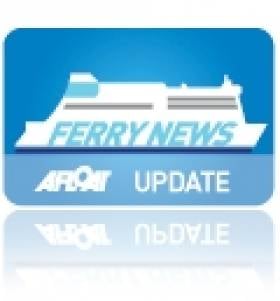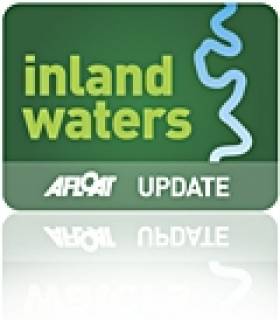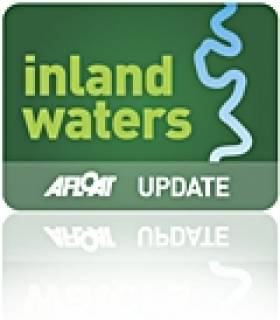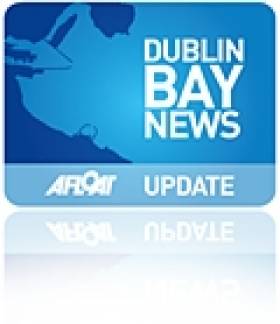Displaying items by tag: INTERREG
Cross-Cutting Marine Opportunities in EU Funding For Research & Business
#MarineScience - The Marine Institute is hosting a one-day event for marine researchers and SMEs looking at cross-cutting opportunities in Horizon 2020 and the Interreg Atlantic Area Programme.
The first part of the day, on Thursday 7 January 2016 from 9.30am to 5.30pm, comprises a half-day course delivered by Dr Seán McCarthy on how to write a competitive proposal for Horizon 2020.
The aim of this course is to train researchers, research managers and research support services in writing professional and competitive proposals for the 'blue growth' programme.
It will describe the relevance of Horizon 2020 to EU policies, and identify common problems in proposal writing and the success criteria for proposals.
The course provides tips on how to collect information, how to select strategic partners and how to avoid duplication in proposal writing. The final section describes a strategy for proposal writing.
Later, Michael O'Brien of the North & Western Regional Assembly will hold an information session on the Interreg Atlantic programme.
This programme area is rich in maritime heritage and marine resources and boasts a strong Atlantic cultural identity. The area is also challenged by ongoing deficits in innovation and SME competitiveness capacity as well as environmental threats including climate change and threats to the biodiversity of the Atlantic area.
The agreed Programme Priorities respond to these challenges and will furthermore exploit opportunities in niche areas such as green growth, renewable energies and eco-Innovation.
The eligible priorities for the 2014-2020 programme period are:
- Stimulating innovation and competitiveness.
- Fostering resource efficiency.
- Strengthening the territory's resilience to risks of natural, climate and human origin.
- Enhancing biodiversity and the natural and cultural assets.
In the afternoon there will be opportunities for one-on-one advisory meetings with national contact points. Meeting rooms will also be available for breakout sessions if required.
For more information on the day and how to attend, visit the Marine Institute website HERE.
#FERRY NEWS - A cross-border project to develop ferry services for island and remote communities of the Irish and Scottish coastlines has received funding in the sixth round of the European Regional Development Fund (EDRF).
A grant of £450,000 (€540,000) has been allocated to procure the world's first ever hybrid RORO ferry for operation in Scotland, following the completion of the INTERREG funded Small Ferries Project.
The project - a cross-border partnership between Caledonian Maritime Assets Limited and administrations in Ireland and Northern Ireland - produced common designs and procurement strategies for a fleet of small ferries which could be used to serve remote coastal communities.
As previously reported on Afloat.ie, five Scottish coastal routes (and three Irish routes) were examined as part of the Small Ferries Project report published in September last year.
Arising from this, Scotland will see the next step in the project by hosting the world’s first hybrid RORO ferry, designed for use on short crossing routes around the Clyde esturary and Hebrides.
The EDRF funding will also be used to develop the corresponding shore infrastructure to enable the ferry to recharge in port.
The first vessel is expected to enter service in Spring 2013.
Ministers Welcome EU Partners on Inland Waters Initiative
Minister Jimmy Deenihan TD Dept of Arts, Heritage and the Gaeltacht (DAHG) and Minister Carál Ní Chuilín, MLA, Department of Culture, Arts and Leisure(DCAL) met delegates from 12 EU countries, Norway and Serbia at a dinner this evening in Dublin Castle to mark the Waterways Forward Masterclasses taking place in Dublin and Enniskillen on the 14th and 15th September.
Facilitated by Waterways Ireland the Masterclasses take place as part of the Waterways Forward INTERREG IVC Project. The Waterways Forward project is focused on the 'enhancement of the management and the boosting of socio-economic development of regional inland waterways and their adjacent waterways' right across Europe.
Department of Arts, Heritage and the Gaeltacht Minister Jimmy Deenihan, T.D, stated
"The future of the waterways both in Ireland and other countries is of huge importance to the economy of all Europe. The meeting is dealing with difficult subjects and I am looking forward to receiving the conference recommendations for an enhanced use and management of the inland waterways for the benefits of all involved."
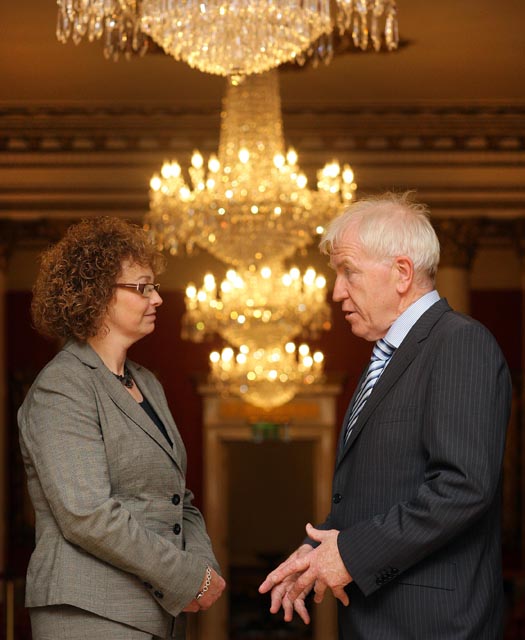
Carál Ní Chuilín Minister for Culture, Arts and Leisure in the Northern Assembly and Jimmy Deenihan TD Minister for Arts, Heritage and the Gaeltacht pictured speaking at the 4th Interregional meeting of the Waterways forward group at Dublin Castle last night Photo: Marc O'Sullivan
Department of Culture, Arts and Leisure Minister, Carál Ní Chuilín, said: "Ireland has some of the most impressive waterways on offer. From the Grand Canal in Dublin to Lough Erne in Enniskillen, Inland waterways have the potential to better connect the economic structures on this island. In the current economic climate such connections can only impact positively on increasing the contribution made by this sector to the all-island economy. The diversity of our waterways and the work being carried out by Waterways Ireland will not fail to impress. This conference will allow Waterways Ireland to plan in a strategic way for future investment in the waterways to improve their navigational, recreation and tourism potential for the benefit of all waterway users."
The Masterclasses will address issues around the sustainable development of inland waterways and the potential impact of climate change on regional inland waterways across Europe.
Lead by the Dutch Recreational Waterways Foundation, the INTERREG IVC Project runs from January 2010 to December 2012 and has a total budget of just over €2.8 million. The Masterclasses are one of a series of meetings, conferences and research projects being undertaken by the partners with the aim of sharing best practice, developing integrated, tailor made governance structures & models and facilitating increased cooperation at EU level.
Waterways Ireland Welcomes European Strategic Partners
Waterways Ireland is facilitating Masterclasses in Dublin and Enniskillen from the 14-15 September 2011 for the 17 EU partners involved in the Waterways Forward INTERREG IVC Project. The Waterways Forward project is focused on the 'enhancement of the management and the boosting of socio-economic development of regional inland waterways and their adjacent waterways' right across Europe.
The Masterclasses will address issues around the sustainable development of inland waterways and the potential impact of climate change on regional inland waterways across Europe. Welcoming the partners to Dublin in advance of the Masterclasses, Waterways Ireland Chief Executive, John Martin stated;
"The INTERREG IVC Project has recognised the unexploited economic resource of regional inland waterways in Europe and the potential contribution that they make to tourism development, economic growth and quality of life. Waterways Ireland is delighted to be a partner in this innovative project. I welcome our 16 partners not only to engage with them in the strategic work of the Masterclasses in developing the way forward for Europe's regional waterways but intend to also share with them the unique attributes of Ireland's inland waterways"
Lead by the Dutch Recreational Waterways Foundation, the INTERREG IVC Project runs from January 2010 to December 2012 and has a total budget of just over €2.8 million. The Masterclasses are one of a series of meetings, conferences and research projects being undertaken by the partners with the aim of sharing best practice, developing integrated, tailor made governance structures & models and facilitating increased cooperation at EU level.
Green Party Speaks Out for Small Boat Owners in Dun Laoghaire
Ciaran Cuffe TD of the Green Party has spoken out in support of small boat owners in a submission to the Dún Laoghaire Harbour Masterplan. Cuffe, a candidate in the General Election, says the prioritisation of space within the harbour for surface car parking and marshalling yards for ferry services has reduced the space available for small boat owners. Cuffe says the masterplan should specifically enhance facilities and storage space for small boat owners, such as the Coal Harbour Users Group (CHUG) and local yacht and water sports clubs. He also says consideration should be given to the development of workshops to promote traditional boat building and small craftrepair and restoration.
The full submission from Ciaran Cuffe is below:
"I welcome the preparation by the Dún Laoghaire Harbour of a masterplan for the harbour area. Dún Laoghaire harbour is a major recreational and amenity resource for the locality andwider Dún Laoghaire area and a long-term strategic vision underpinned by a plan-ledimplementation framework is vital in order to secure the harbour's future for the benefit of both the Harbour Company and the local community.
Maintaining a ferry link to the UK
I welcome the proposal to redefine Dún Laoghaire Harbour as a leisure harbour. However, Ibelieve that future opportunities to keep a ferry link with the UK should not be lost. As we have seen during recent incidents when airplanes were grounded, travelling by ferry is still aviable means of travel and may become increasingly so in the future. A seasonally ferryduring the summer months could be considered and the infrastructure needed for a ferryservice should be maintained. The Harbour Company should work to secure INTERREG funding to provide better linked-in ferry and train services between Ireland and the UK.
Cruise Ships & Tourist Development
There is considerable scope to attract the cruise liner market to Dún Laoghaire. Dún Laoghaire is a fantastic harbour location with a unique built and natural heritage. Its location immediately adjacent to the Dún Laoghaire DART station makes it an ideal gateway locationfor tourists to explore Dublin City and hinterland. We have seen the positive impact of large cruise liners docking at Dublin Port with thousands of visitors disembarking, visiting Dublin's tourist attractions and spending money in local businesses. Dún Laoghaire Harbours offers a much more pleasant and suitable docking location for cruiseships and there is a major opportunity to exploit this economic potential for the benefit of the wider locality. Any physical works required to facilitate the mooring of large cruise liners in Dún Laoghaire should be carefully designed so as to avoid any adverse impact on local builtand natural heritage, including the Dublin Bay Special Area of Conservation.
Built Heritage
The unique physical fabric and built heritage Dún Laoghaire Harbour is an important assetand must be conserved and enhanced. In particular, the historic Carlisle Pier now has thepotential to provide a high quality outdoor public amenity space. I understand that elements of the 1890's Victorian railway building have been retained and I believe that these elements should be reconstituted as part of multi-functional covered space to, for example, host an ice-rink in winter, the Festival of World Cultures in summer and occasional outdoor events andmarkets.
Open Space & Public Accessibility
In recent years significant areas of the Harbour Company land was converted to revenuegenerating surface car parking. This has created a car dominated environment and adisconnect between the harbour area and Dún Laoghaire town. The long-term future of theharbour is much better served by opening up the harbour area to pedestrians and cyclists, enhancing accessibility for the general public, improve directional signage, reducing surfacecar parking and delivering more green spaces. In order to achieve this, the Masterplan shouldinclude a detailed design framework for the public realm including further measures to removethe barriers to accessibility due to the rail line.
Views
The sensitive built, natural and visual environment of the harbour requires a very carefulapproach to any future infill development. Particularly, infill development should be in keepingwith the existing building heights of the town to protect the harbour setting and views fromDún Laoghaire to Dublin Bay and Howth Head and sensitively designed to conserve thecharacter of local built heritage and the numerous important protected structures.
Small Boat Owners
The prioritisation of space within the harbour for surface car parking and marshalling yards for ferry services has reduced the space available for small boat owners. The masterplan should specifically enhance facilities and storage space for small boat owners, such as the CoalHarbour Users Group (CHUG) and local yacht and water sports clubs. Consideration should be given to the development of workshops to promote traditional boat building and small craftrepair and restoration.
Conclusion
Dún Laoghaire is extremely fortunate to have a unique historic harbour resource, which is a central part of the local identity and a much loved and valued social, recreational, and amenity resource. However, the future economic viability of the harbour is dependent on creating appropriate synergies with the wider economy of Dún Laoghaire. The imaginative redevelopment of the harbour can contribute significantly to the local economy, particularly inthe development of heritage and tourism initiatives, The Masterplan must focus on how the future development of the harbour can contribute to cultivating these synergies in a manner, which is economically, socially and environmentally sustainable."



























